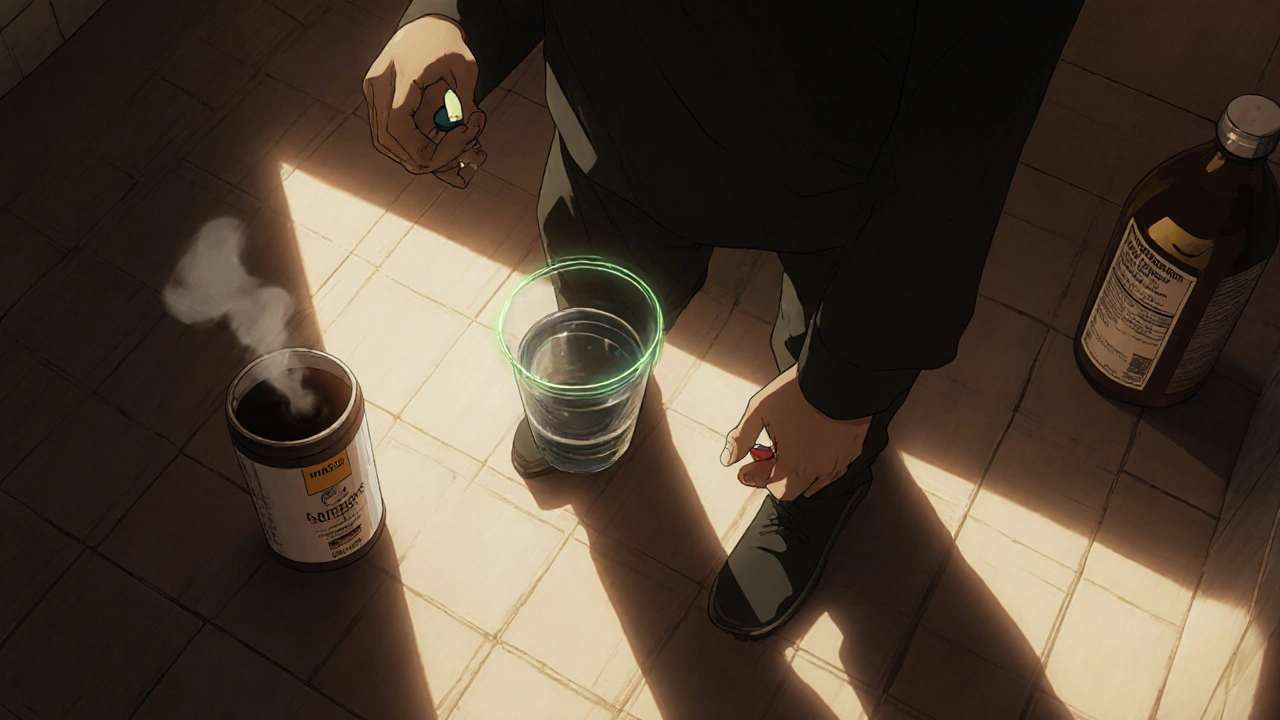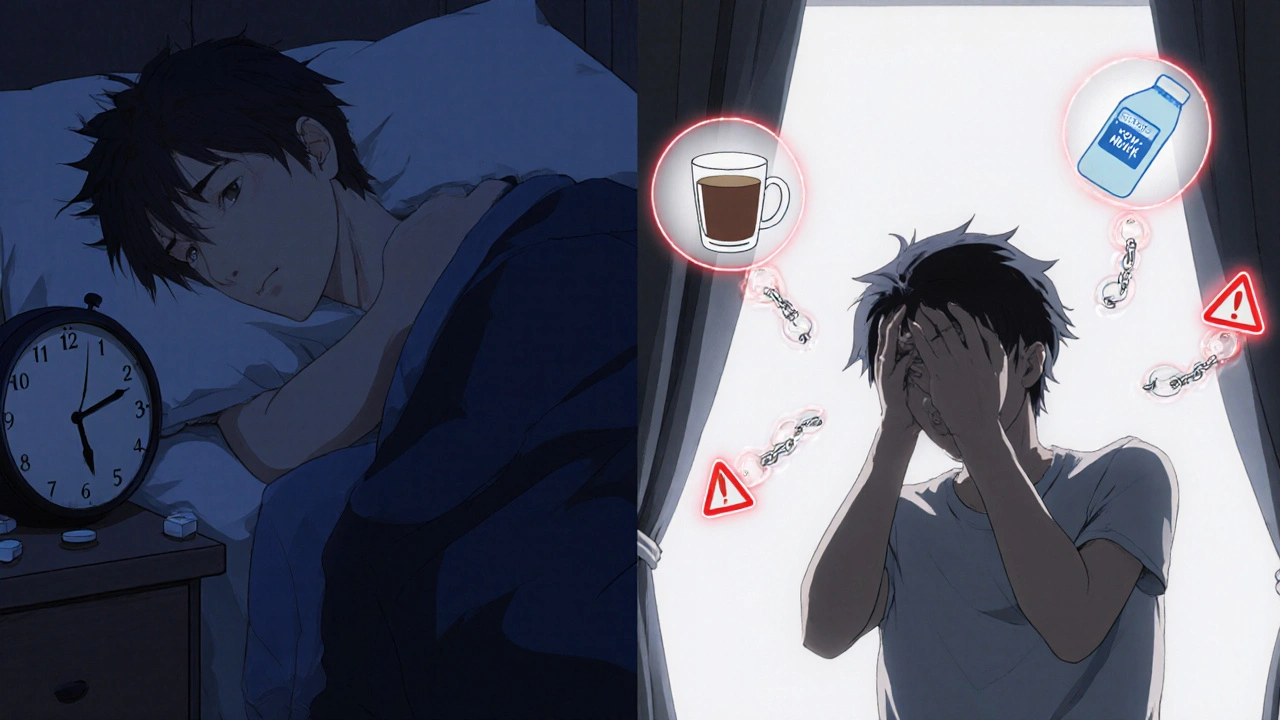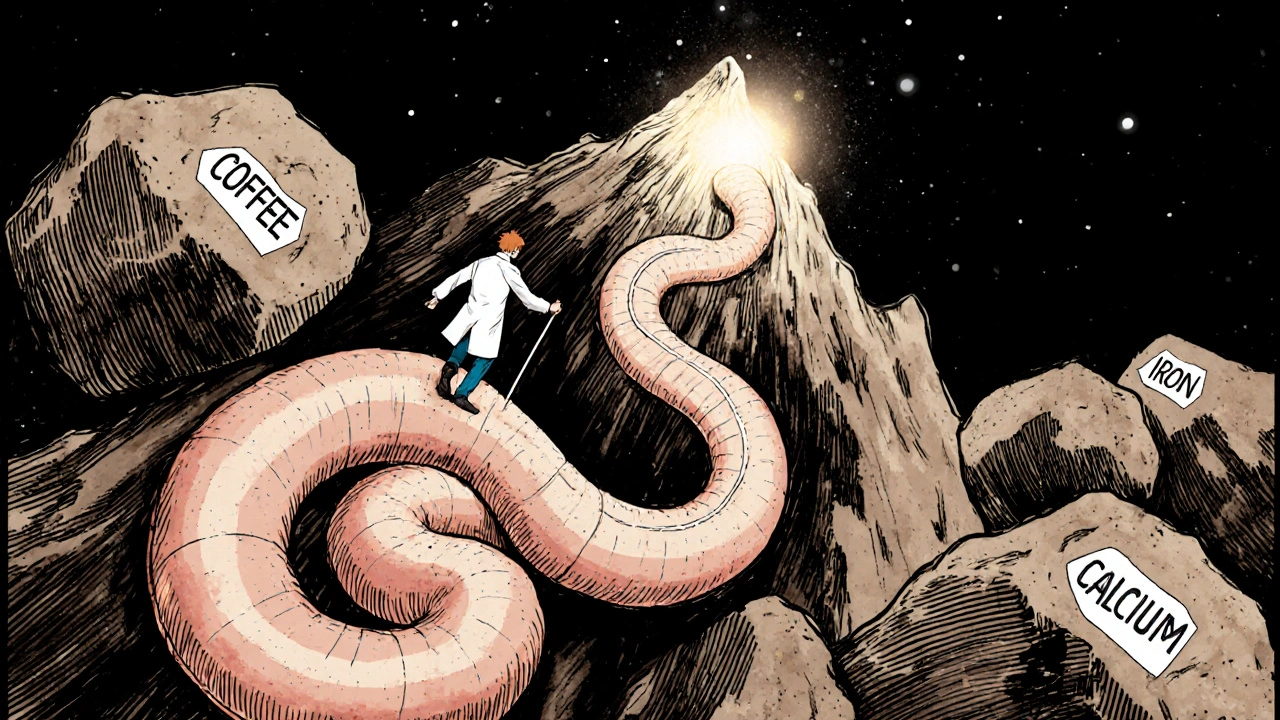Thyroid Medications: How to Take Levothyroxine Right to Avoid Absorption Problems
 Nov, 19 2025
Nov, 19 2025
Thyroid Medication Absorption Calculator
Calculate Your Absorption Rate
Enter how you take your levothyroxine to see how much medication is actually absorbed by your body.
Results
Estimated Absorption
0% of your dose is absorbed
Effect on TSH
Recommendations
Why This Matters
Most people taking thyroid medication don’t realize that levothyroxine doesn’t work the same way if they take it with coffee, breakfast, or a multivitamin. Even a small mistake in timing can throw off your thyroid hormone levels, making you feel tired, sluggish, or anxious-all because your body didn’t absorb the dose properly.
Why Timing Matters More Than You Think
Levothyroxine is a synthetic version of the thyroid hormone T4. It’s not like a painkiller you can take anytime. This drug has a narrow therapeutic window, meaning there’s a tiny range between too little and too much. If your body absorbs only 70% of your dose instead of 95%, your TSH levels can jump from 1.8 to 4.3 in just a few weeks. That’s enough to bring back fatigue, weight gain, brain fog, and depression-even if you’re taking the right pill every day.
Studies show that taking levothyroxine with food cuts absorption by up to 36%. One 2009 study found that patients who took their pill with breakfast had TSH levels 176% higher than those who took it on an empty stomach. That’s not a small difference-it’s enough to make your doctor think your dose is too low and increase it unnecessarily.
What Ruins Levothyroxine Absorption
It’s not just food. Many common substances interfere with how your body absorbs this medication. Here’s what you need to avoid within 3-4 hours of taking your pill:
- Calcium supplements - Reduce absorption by 27-36%
- Iron supplements - Cut absorption by 39%
- Coffee - Lowers absorption by 36% (even black coffee)
- Soy products - Soy milk, tofu, edamame can block uptake
- Fiber supplements - Psyllium, methylcellulose, and high-fiber cereals interfere
- Proton pump inhibitors - Omeprazole (Prilosec), lansoprazole (Prevacid) change stomach pH
- Multivitamins with minerals - Especially those containing iron or calcium
These aren’t myths. They’re backed by clinical studies published in the Journal of Clinical Endocrinology & Metabolism, Thyroid, and Archives of Internal Medicine. If you take calcium for bone health or iron for anemia, you need to space them out. Same with your daily multivitamin.
Best Time to Take It: Morning vs. Bedtime
The traditional advice is to take levothyroxine first thing in the morning, 30-60 minutes before eating or drinking anything but water. That’s still the gold standard-and for good reason. Most studies show this timing gives the most consistent absorption.
But here’s the twist: some people do better taking it at night. A 2020 systematic review of 12 studies found that bedtime dosing led to slightly lower TSH levels and higher free T4 levels compared to morning dosing. Why? Because the stomach is empty longer at night, and there’s less interference from food or other meds.
One patient on ThyroidChange.com reported, “Switching to bedtime dosing stabilized my TSH after years of erratic morning results-I’ve maintained 1.2 for 18 months now.” That’s not rare. About 15% of U.S. patients now take it at night, according to GoodRx data.
But don’t switch without talking to your doctor. If you’ve been taking it in the morning for years and your TSH is stable, there’s no need to change. But if you’re struggling to remember it before breakfast, or you get stomach upset on an empty stomach, nighttime dosing might be a better fit.

Who Should Stick to Morning Dosing
Not everyone can switch. Certain groups need strict morning timing:
- Pregnant women - Thyroid hormone is critical for fetal brain development. The American Thyroid Association recommends taking levothyroxine 30-60 minutes before breakfast to ensure consistent levels.
- Thyroid cancer patients - These patients need TSH suppressed below 0.1 mIU/L. Even small absorption changes can affect treatment success.
- People with malabsorption disorders - Celiac disease, Crohn’s, or gastric bypass surgery can already make absorption tricky. Adding food or coffee makes it worse.
For these groups, the morning routine isn’t optional-it’s medical necessity.
Real-Life Challenges and Workarounds
Let’s be honest: life doesn’t always let you wait 30 minutes before breakfast. Many people rush out the door, grab coffee, and forget their pill. Others feel nauseous taking it on an empty stomach. Here’s what actually works:
- Place your pill next to your toothbrush - That way, you can’t skip it without seeing it.
- Use a weekly pill organizer - Fill it every Sunday. Turn the bottle upside down after dosing so you know you’ve taken it.
- Set a phone alarm - A 2022 study showed smartphone reminders improved adherence by 38% compared to pillboxes alone.
- Take it at night if mornings don’t work - Just make sure it’s at least 3-4 hours after your last meal. No snacks, no late-night tea, no yogurt.
One Reddit user wrote: “I used to take it with my coffee and felt awful. Switched to 10 p.m. with water, and within a month, my energy came back. My TSH dropped from 3.9 to 1.5.”

New Formulations Are Coming (But Don’t Count on Them Yet)
The good news? Science is catching up. In 2017, the FDA approved Tirosint-SOL, a liquid form of levothyroxine that doesn’t interact with food or coffee. Studies show it works just as well whether you take it with breakfast or on an empty stomach.
There’s also a new delayed-release tablet in phase 3 trials that’s designed to release the hormone only after it passes through the stomach-so food doesn’t interfere. Early results show 92% of patients maintained stable TSH levels even with inconsistent timing.
But here’s the catch: these newer forms are expensive and not widely covered by insurance. As of 2023, 89% of prescriptions are still for the traditional tablet. So unless you’re paying out of pocket or your doctor specifically recommends it, you’re probably still on the standard pill-and that means timing matters.
What to Do Right Now
Here’s your simple action plan:
- Take your pill with a full glass of water - Don’t use juice, milk, or coffee.
- Wait 30-60 minutes before eating or drinking anything else - This includes coffee, tea, and breakfast.
- Separate calcium, iron, and multivitamins by 3-4 hours - Take them at lunch or dinner, not with your thyroid pill.
- If mornings don’t work, try bedtime - But only after your last meal, and only with your doctor’s approval.
- Get your TSH checked 6-8 weeks after changing your routine - Don’t assume it’s fine. Test it.
If you’ve been taking your pill with food or coffee and feeling off, this might be why. You’re not failing. Your body just needs the right conditions to absorb what you’re giving it.
Can I take levothyroxine with water?
Yes, water is the only safe liquid to take with levothyroxine. Avoid coffee, tea, juice, milk, or soy milk-they all interfere with absorption. Drink a full glass right when you take the pill.
What if I forget and take it with breakfast?
If you accidentally take it with food, don’t double up. Wait until the next day and go back to your normal routine. One mistake won’t wreck your treatment, but doing it regularly will cause your TSH to drift. Keep track of when it happens so you can adjust your habits.
Can I take levothyroxine at night instead of in the morning?
Yes, for many people, nighttime dosing works just as well-or better. Take it at least 3-4 hours after your last meal, and avoid snacks or drinks (except water) afterward. Talk to your doctor first, especially if you have thyroid cancer or are pregnant.
Why does coffee affect thyroid medication?
Coffee changes the pH and flow in your gut, reducing how much levothyroxine your body absorbs. A 2017 study showed a 36% drop in absorption when taken with coffee. Even waiting an hour after coffee doesn’t fix it. The safest move: take your pill before coffee.
How long should I wait after taking levothyroxine before eating?
Wait 30-60 minutes. This gives your body enough time to absorb the medication before food, acid, or other substances interfere. If you’re taking it at night, wait 3-4 hours after your last meal before taking the pill.
Do I need to take levothyroxine at the same time every day?
Yes. Consistency is key. Even if you’re taking it at night, try to take it around the same time every day. Fluctuating your timing can cause your TSH levels to bounce up and down, making it harder for your doctor to adjust your dose properly.
Final Thought: It’s Not About Perfection-It’s About Consistency
You don’t have to be perfect. But you do have to be consistent. If you take your pill the same way every day-with water, on an empty stomach, and without interference-you’ll get the most stable results. If you can’t do that in the morning, nighttime is a valid alternative. The goal isn’t to follow a rule for the sake of it. It’s to make sure your body gets the full dose so you feel your best.
Russ Bergeman
November 21, 2025 AT 01:28Dana Oralkhan
November 22, 2025 AT 02:02Also-nighttime dosing? I’m trying it tomorrow. No more rushing out the door with a pill in my hand and a latte in the other.
Alyssa Torres
November 22, 2025 AT 19:15Also, bedtime dosing is a game-changer. I take it at 11pm. No coffee, no snacks, just me, my water, and my peace. My energy is back. I’m not a zombie anymore. I love you, science.
Summer Joy
November 23, 2025 AT 12:38Aruna Urban Planner
November 24, 2025 AT 04:05daniel lopez
November 24, 2025 AT 23:37Nosipho Mbambo
November 26, 2025 AT 13:58Katie Magnus
November 27, 2025 AT 22:08King Over
November 28, 2025 AT 07:13